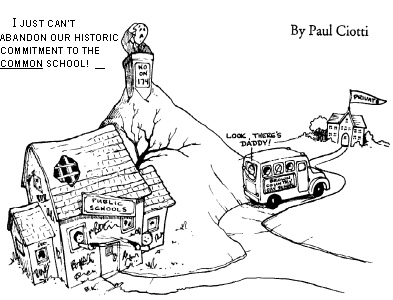ONE UNION'S WAR AGAINST CHOICE

"There are some proposals," said CTA President Del Weber,
"that are so evil they should never even be presented to the
voters." Why has this vastly wealthy, enormously powerful
organization become so hysterical about 174?
THERE WAS a time when public schools devoted themselves
to helping the children learn without regard to the teachers'
personal ideology, self-interest, or political agenda. But
as Tom Hayden likes to say: "That was then. Now is now." As
violence has soared and test scores have plummeted over the
last 30 years, public schools are now not so much seen as
the last best hope for a free society but rather as a major
cause of its steep decline. And a lot of the blame goes to
teachers unions.
Instead of standing up against pressures to lower standards,
eliminate discipline, and demoralize the schools with ideological
fads, teachers unions have often supported some of the most
destructive tendencies in public education while simultaneously
fighting tooth and nail such genuine reforms as competency
testing, merit pay, standardized testing, decentralization,
parental authority, and, most especially, that 800-pound
gorilla of educational reform –school vouchers.
ONE WOULD think with its 230,000 union members and its bulging
$10 to $15 million-plus war chest, the California Teachers
Association (CTA) wouldn't be so visibly hysterical about
Proposition 174, the lightly-funded and bitterly-criticized
voucher initiative. But ever since Proposition 174 qualified
for the ballot last summer, CTA President Del Weber has been
a whirlwind of pejoratives, calling the initiative "dishonest,
divisive, and destructive," "a cynical fraud," "an evil measure,"
and "the single greatest threat ever to face school children
in California." Acting state Superintendent of Public Instruction
William D. Dawson described it as "a giant meteor crashing
toward Planet Education." United Teachers of Los Angeles President
Helen Bernstein called it an educational "Armageddon." There
can't be any holding back on this one, she told her troops
–"without decisive action there will be no tomorrow."
The reason is, unlike the warm-milk-and-sugar-cookie reforms of the past,
vouchers actually have the power to transform the system. "Most other reforms
they can handle," says Stanford political scientist Terry Moe. "New tests, new
curricula, or even school-based management doesn't threaten the system. But vouchers
revolutionize the system and they can't allow that."



